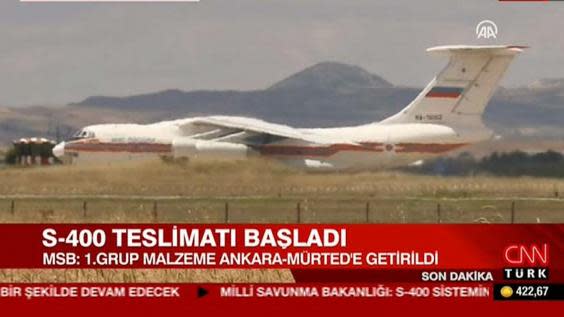Turkey delights Putin and irks Trump as it begins taking delivery of Russian missile system
Turkey has begun taking delivery of a Russian missile system that has irked US officials but serves as a win for both President Recep Tayyip Erdogan and the Kremlin.
Turkish television showed scenes of three Russian cargo planes arriving at a military airport in the Turkish capital, Ankara, reportedly carrying parts for the S-400 advanced air defence system.
"The transfer of the first group of S-400 long-range air and missile defence systems to the Murted Air Base started on 12 July," the defence ministry reported in a tweet. Russian officials confirmed the deliveries.
Local news outlets reported that it could take up to five months for all the parts to arrive. The missiles for the system are expected to arrive separately in sea vessels.
The potential delivery of the S-400s had prompted White House threats of economic sanctions and other reprisals against the NATO member. The purchase violates US sanctions on Russia’s military industry and raises concerns that it could undermine NATO security.
"Turkey has made a very bad choice," US Senator Chris Van Hollen, a Maryland Democrat, wrote on Twitter Friday. "This is not the conduct of an ally. Unless it reverses course, Turkey will not receive the F-35 aircraft and any move to deploy the Russian S-400 system must be met with immediate sanctions under U.S. law."
But the delivery of the $2.5 billion weapons system, ordered in 2017, represents a significant strategic and economic win for Moscow, which is trying to boost its arms industry as well as weaken the NATO alliance.
Russian President Vladimir Putin has assiduously courted Turkish President Recep Tayyip Erdogan over the last three years, exploiting Turkey’s frustrations with Washington over its Syria policy and cosy relations with Gulf Arab monarchs to lure Ankara closer into its orbit.
“This is a formula to cement Turkey’s political relationship with Russia at a time when the relationship with the US went in the opposite direction,” said Sinan Ulgen, a Turkey specialist at the Carnegie Endowment for International Peace
US officials have warned of imposing economic sanctions as required by Congress and booting Turkey from the programme to develop and deploy advanced F-35 fighter jets if Turkey took delivery of the S-400 mobile anti-aircraft missile launchers. Turkey's economy is already suffering from high inflation and unemployment exacerbated by high foreign debt.
But Mr Erdogan has said that US President Donald Trump was not as determined to punish Turkey as some others in his administration.
“Mr Trump has not said ‘We will impose sanctions against you’ during my phone conversations with him or in our bilateral meetings so far,” Mr Erdogan was quoted as saying earlier this month.
The purchase itself is hardly a strategic game-changer. Turkey will receive only 128 missiles. But the US says it is worried that the Russian personnel entering Turkey’s defence establishment under the guise of helping instal the system and train operators could undermine NATO security. Other critics say the purchase may not improve Turkey’s defence capabilities.

“This is not going to be conducive to enhancing Turkey’s security aspirations,” said Mr Ulgen. "It is true that Turkey is in need of improving its own national capabilities of protecting itself over the threat of ballistic missiles. But this is not an answer to that. The S-400 cannot be used to counter that threat.”
The delivery also represents something of a political win for Mr Erdogan, who is still licking wounds from his party’s losses in recent municipal elections.
“During the last months, S-400 became a domestic political issue for Mr Erdogan,” said Aydin Sezer, a former Turkish diplomat and columnist for Medya Gunlugu, a news outlet. “This is important leverage for Erdogan to consolidate his political party.”
Turks have complained that for years Ankara was seeking to buy drones or missile-defence systems from the US only to be hampered or offered deals that were on unfavourable terms.
Both supporters and opponents of Mr Erdogan support the purchase of a defence system designed to counter Western power amid rampant mistrust of the US and fears it might launch an attack on Turkey at some point in the future. A poll this month showed 44 per cent of Turks support the purchase, with only 24 per cent opposed.
Older Turks remember the US arms embargo over Cyprus in the 1970s, and many don’t see Washington as a trusted partner when it comes to arms sales. Left-leaning Turks see the purchase as defiance against Western imperialism.
“They think that this move is somehow a proclamation of independence and protecting Turkey from world powers like NATO and the US,” said Mr Sezer.
Mr Ulgen acknowledged ‘bipartisan support” for the purchase, but said many of those in favour “are not aware of the costs related to acquiring the weapons.”

